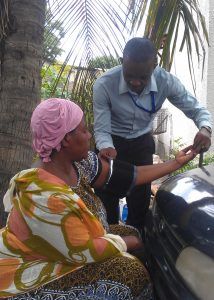
One early summer morning, Mr. T.K., a 56 year-old secondary school teacher from Lagos, Nigeria, woke up unable to move the right side of his body and had extreme difficulty talking. He was forced to stay in bed until his children came looking for him and decided to take him to a general hospital. There, he was diagnosed with an ischemic stroke secondary to uncontrolled hypertension. Luckily, his family was then able to move him to a private hospital where his wife works, 150 miles away in Ibadan. He was discharged after seven days with minimal weakness on his right side and partially controlled blood pressure.
Not all stroke patients are as lucky as Mr. T.K. Each year, 17 million people die of heart disease and stroke worldwide (one death every two seconds), with 80% of these deaths occurring in low- and middle-income countries. At least half of these deaths are preventable using well-known and effective lifestyle or medical interventions, but unfortunately, most patients lack access to these interventions.
The Lown Scholars Program strives to change this global picture by training a cadre of mid-career professionals who would serve as agents of change in their communities and countries by designing, implementing and evaluating cardiovascular disease prevention programs. Each year, the Lown Scholars Program admits about a dozen new Lown Scholars through a competitive application process and hosts them for a month-long Summer Program in Boston. During the Summer Program, they take courses and develop their proposals under the guidance and mentorship of Harvard Chan School faculty and other Lown Scholars. The proposed projects will be evaluated by the Steering Committee with a strong emphasis on the potential impact of the project on the health and well-being of the selected communities.
Story submitted by
Drs. Lawretta Mukoru (Family Medicine Resident) and Ike Oluwapo Ajayi (Consultant Family Physician and Epidemiologist, Lown Scholar)




You must be logged in to post a comment.